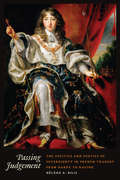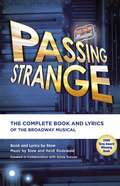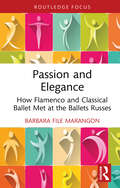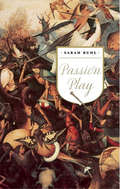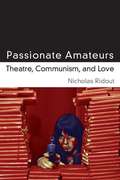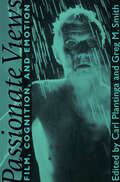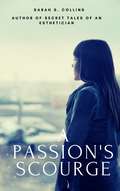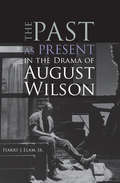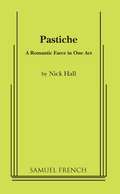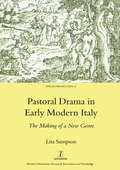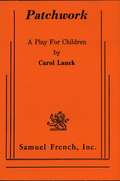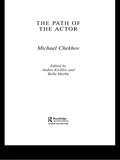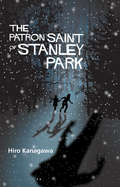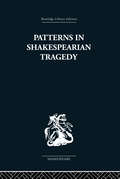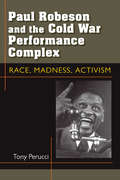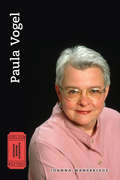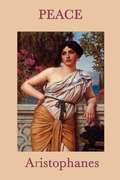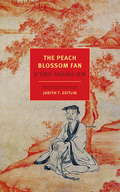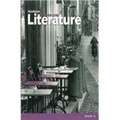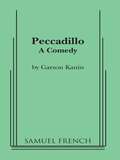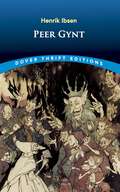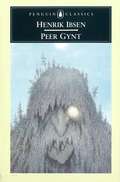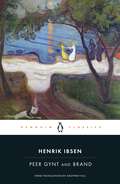- Table View
- List View
Passing Judgment: The Politics and Poetics of Sovereignty in French Tragedy from Hardy to Racine
by Helene E. BilisThe royal judge was an archetypal character in French tragedy during the 17th century. This figure impersonated the king by asserting his judicial authority and bringing order to an otherwise chaotic world.In Passing Judgment, Hélène Bilis examines how an overlooked character-type--the royal judge--remained a constant of the tragic genre throughout the 17th century, although the specifics of his role and position fluctuated as playwrights experimented with changing models of sovereignty onstage. Her readings analyze how this royal decision-maker stood at the intersection of political and theatrical debates, and evolved through a process of trial and error in which certain portrayals of kingship were deemed obsolete and were discarded, while others were promoted as culturally allowable and resonant. In tracing the royal judge's persistent presence and transformation, Bilis argues that we can better grasp the weighty political stakes of theatrical representations under the ancien régime.
Passing Strange: The Complete Book and Lyrics of the Broadway Musical
by StewThe innovative new musical won the 2008 Tony Award for Best Book and is soon to be a Spike Lee film.
Passion and Elegance: How Flamenco and Classical Ballet Met at the Ballets Russes (ISSN)
by Barbara File MarangonThis book commences with the history of Indian, Egyptian, Arab, and flamenco dance, then compares and contrasts the history of both classical ballet and flamenco.The book outlines the early roots of flamenco in India, and the journey of the Romani through the Middle East and Europe up to their final destination in Spain. Alongside this, the history of classical ballet is detailed from its beginning in Italy to its later development in France. The book spans the period from the temples of India to Massine’s Spanish ballet, The Three-cornered Hat, for the Ballets Russes. The chronicle of flamenco's journey from India to Spain is important to understanding the development of classical ballet as it relates to The Three-cornered Hat, which is the culmination of the story. The evolution of costumes, space, scenery, and props is examined along with the historical parallels.This exploration is set to inspire and encourage choreographers to partner other dance forms with ballet as Leonide Massine did with flamenco in The Three-cornered Hat while also challenging the anthropological idea of the language of dance movement tracing the migration of people.
Passion Play
by Sarah RuhlNamed one of the "Ten Best Plays of 2008" by The New Yorker"Sarah Ruhl's bold, inventive, and ironic triptych [is] a meditation on devotion and its appropriation by the state. . . . Ruhl is an original; a storyteller with a fine mind evolving her own theatrical idiom."--John Lahr, The New Yorker"It's a different kind of morality play . . . an often wondrous work . . . with [Ruhl's] own special lyrical blend of poetry, humor and grace."--Frank Rizzo, VarietyPassion Play is Sarah Ruhl's "biggest, most ambitious effort yet" (The New York Times), a three-and-a-half hour intimate epic, plunging the depths of the timely intersection of politics and religion. Ruhl dramatizes a community of players rehearsing their annual staging of the Easter Passion in three different eras: 1575 northern England, just before Queen Elizabeth outlaws the ritual; 1934 Oberammergua, Bavaria, as Hitler is rising to power; and Spearfish, South Dakota, from the time of Vietnam through Reagan's presidency. In each period, the players grapple in different ways with the transformative nature of art, and politics are never far in the background, as Queen Elizabeth, Hitler, and Reagan each appear, played by a single commanding actor.Sarah Ruhl's plays include Dead Man's Cell Phone, Eurydice, and The Clean House, which was nominated for the Pulitzer Prize. Her work has been widely produced both throughout the country and internationally, and she is the recipient of the MacArthur "Genius" Fellowship.
Passionate Amateurs: Theatre, Communism, And Love
by Nicholas RidoutPassionate Amateurs tells a new story about modern theater: the story of a romantic attachment to theater’s potential to produce surprising experiences of human community. It begins with one of the first great plays of modern European theater—Chekhov’s Uncle Vanya in Moscow—and then crosses the 20th and 21st centuries to look at how its story plays out in Weimar Republic Berlin, in the Paris of the 1960s, and in a spectrum of contemporary performance in Europe and the United States. This is a work of historical materialist theater scholarship, which combines a materialism grounded in a socialist tradition of cultural studies with some of the insights developed in recent years by theorists of affect, and addresses some fundamental questions about the social function and political potential of theater within modern capitalism. Passionate Amateurs argues that theater in modern capitalism can help us think afresh about notions of work, time, and freedom. Its title concept is a theoretical and historical figure, someone whose work in theater is undertaken within capitalism, but motivated by a love that desires something different. In addition to its theoretical originality, it offers a significant new reading of a major Chekhov play, the most sustained scholarly engagement to date with Benjamin’s “Program for a Proletarian Children’s Theatre,” the first major consideration of Godard’s La chinoise as a “theatrical” work, and the first chapter-length discussion of the work of The Nature Theatre of Oklahoma, an American company rapidly gaining a profile in the European theater scene. Passionate Amateurs contributes to the development of theater and performance studies in a way that moves beyond debates over the differences between theater and performance in order to tell a powerful, historically grounded story about what theater and performance are for in the modern world.
Passionate Playgoing in Early Modern England
by Allison P. HobgoodAllison P. Hobgood tells a new story about the emotional experiences of theatregoers in Renaissance England. Through detailed case studies of canonical plays by Shakespeare, Jonson, Kyd and Heywood, the reader will discover what it felt like to be part of performances in English theatre and appreciate the key role theatregoers played in the life of early modern drama. How were spectators moved - by delight, fear or shame, for example - and how did their own reactions in turn make an impact on stage performances? Addressing these questions and many more, this book discerns not just how theatregoers were altered by drama's affective encounters, but how they were undeniable influences upon those encounters. Overall, Hobgood reveals a unique collaboration between the English world and stage, one that significantly reshapes the ways we watch, read and understand early modern drama.
Passionate Views: Film, Cognition, and Emotion
by Carl Plantinga and Greg M. SmithThe movie theater has always been a place where people come together to share powerful emotional experiences, from the fear generated by horror films and the anxiety induced by thrillers to the laughter elicited by screwball comedies and the tears precipitated by melodramas. Indeed, the dependability of movies to provide such experiences lies at the center of the medium's appeal and power. Yet cinema's ability to influence, even manipulate, the emotions of the spectator is one of the least-explored topics in film theory today.In Passionate Views, thirteen internationally recognized scholars of film studies, philosophy, and psychology explore the emotional appeal of the cinema. Employing a novel cognitive perspective, the volume investigates the relationship between genre and emotion; explores how film narrative, music, and cinematic techniques such as the close-up are used to elicit emotion; and examines the spectator's identification with and response to film characters.An impressive range of films and topics is brought together by Carl Plantinga and Greg M. Smith, including: the success of Stella Dallas and An Affair to Remember as tearjerkers; the power of Night of the Living Dead to inspire fear and disgust; the sublime evoked in The Passion of Joan of Arc, Aguirre, the Wrath of God, and The Children of Paradise; the emotional basis of film comedy as seen in When Harry Met Sally; the use of cinematic cues in Raiders of the Lost Ark and Local Hero to arouse emotions; the relationship between narrative flow and emotion in Once Upon a Time in the West and E.T.; the emotive use of music in The Elephant Man and A Clockwork Orange; Stranger than Paradise's sense of timing; desire and resolution in Casablanca; audience identification with the main characters in Groundhog Day and The Crying Game; portrayal of perversity in The Silence of the Lambs, Flaming Creatures, and Shivers; and empathy elicited through closeups of actors' faces in Yankee Doodle Dandy and Blade Runner.Passionate Views offers a new approach to our understanding of film and will be of interest to anyone fascinated by the emotional power of motion pictures and their relationship to the central concerns of our lives, as well as by the techniques filmmakers use to move an audience.
A Passion's Scourge
by Sarah S. CollinsThe book narrates the life of Elena, a young woman who has her destiny stained by suffering upon getting involved with John. A mysterious unknown man. On the moment that she meets John, she falls in love. Convinced that he was the man of her life, she decides to marry him. Some time after the marriage John reveals himself aggressive, violent and tends to have a cold temperament towards his wife. Disappointed, Elena feels alone and depressed. And so it starts a martyrdom which she never imagined to live. When love is confronted by the boundaries of tolerance, reason stops making sense. She, a young woman that dreamed to find her first love. He, a man who lives strapped to his inner world, tormented by his past and the ghosts of his memories, who feels incapable to live with a loved one. Misconduct, vileness and insanity. Will it be possible for love to survive through that? A tragic fate that will change all concepts of love. A love and passion story based in real events.
The Past as Present in the Drama of August Wilson
by Harry J. Elam Jr.Pulitzer-prizewinning playwright August Wilson, author of Fences, Ma Rainey's Black Bottom, and The Piano Lesson, among other dramatic works, is one of the most well respected American playwrights on the contemporary stage. The founder of the Black Horizon Theater Company, his self-defined dramatic project is to review twentieth-century African American history by creating a play for each decade. Theater scholar and critic Harry J. Elam examines Wilson's published plays within the context of contemporary African American literature and in relation to concepts of memory and history, culture and resistance, race and representation. Elam finds that each of Wilson's plays recaptures narratives lost, ignored, or avoided to create a new experience of the past that questions the historical categories of race and the meanings of blackness. Harry J. Elam, Jr. is Professor of Drama at Stanford University and author of Taking It to the Streets: The Social Protest Theater of Luis Valdez and Amiri Baraka (The University of Michigan Press).
Pastiche
by Nick HallRomantic Farce. Nick Hall . Characters: 2 male, 2 female. Interior Set . Sir Peter, has planned a dinner for two. His companion is Viola, a young chorus girl. But he's forgotten it's his wedding anniversary-- his wife, Lady Alexandra, comes home early and aided by the butler, Medford, turns Sir Peter's evening into a shambles. Medford interrupts the dinner disguised as a policeman-- then Lady Alexandra appears in a Salvation Army uniform-- then Medford in the guise of a gypsy violinist-- and finally the two of them disguised as Sir Peter's parents. Viola-- unlike Sir Peter-- is unaware of their true identity and leaves in a huff. Sir Peter and his wife make up and sit down to an anniversary supper.
Pastoral Drama in Early Modern Italy: The Making of a New Genre
by Lisa Sampson"Emerging in Italy in the mid-sixteenth century, pastoral drama is one of the most characteristic genres of its time. Sampson traces its uneven development into the following century by exploring masterpieces by Tasso and Guarini, and many lesser known works, some by women writers. She examines the treatment of key themes of love, the Golden Age, and Nature and Art against the background of the textual and stage production of the plays. An investigation of critical writings associated with the genre further reveals its significance to the contemporary literary scene, by stimulating 'modernizing' attitudes towards the canon, as well as new enquiries into the function and possibilities of art."
Patchwork
by Carol LauckComedy / 2m, 2f, minimum / Flexible staging / A cleverly designed ensemble of old fashioned fables and contemporary foibles, Patchwork is stitched together with wit and wisdom. Fast paced, funny and thought provoking, each scene is visually and mentally stimulating. Promising at the start to ". . . wiggle your giggle and tickle your noodle", the actors play 41 roles in 14 scenes. Each scene is introduced by a patch ready to be sewn, with the completed quilt presented at the conclusion.
The Path Of The Actor
by Michael ChekhovThis is the first English translation of Michael Chekhov’s two-volume autobiography, combining The Path of the Actor (1927) and extensive extracts from his later volume Life and Encounters. Full of illuminating anecdotes and insightful observations involving prominent characters from the MAT and the European theatre of the early twentieth century, Chekhov takes us through events in his acting career and personal life, from his childhood in St. Petersburg until his emigration to Latvia and Lithuania in the early 1930s. Accompanying Chekhov's witty, penetrating, and immensely touching accounts are extensive and authoritative notes compiled by leading Russian Chekhov scholar, Andrei Kirillov. Anglo-Russian trained actor Bella Merlin provides a useful hands-on overview of how the contemporary practitioner might utilise and develop Chekhov's ideas. Chekhov was arguably one of the greatest actors of the twentieth century. His life made a huge impact on his profession, and his actor-training techniques inspired many a Hollywood legend – including such actors as Anthony Hopkins and Jack Nicholson -while his books outlining his teaching methods and philosophy of acting are still bestsellers today The Path of the Actor is an extraordinary document which allows us unprecedented access into the life, times, mind and soul of a truly extraordinary man.
The Patron Saint of Stanley Park
by Hiro KanagawaSiblings Josh and Jennifer are coping with the loss of their father, who disappeared in a floatplane accident last Christmas Eve. Their mother wants to pretend everything is normal, while Jennifer is angry and isolated and Josh scours the Internet for proof that their father is still alive. So on Christmas Eve, when the children are supposed to catch a bus to their uncle's place, they go to Stanley Park instead and make their way to Prospect Point to honour their father's memory. When a catastrophic windstorm thwarts their plans, Skookum Pete, a strange vagabond who roams the park, takes them to a fantastical bunker beneath the park, where they experience wondrous visions that help them understand the truth about their father.
Patterns in Shakespearian Tragedy (Methuen Library Reprints)
by Irving RibnerFirst published in 1960. Patterns in Shakespearian Tragedy is an exploration of man's relation to his universe and the way in which it seeks to postulate a moral order. Shakespeare's development is treated accordingly as a growth in moral vision. His movement from play to play is carefully explored, and in the treatment of each tragedy the emphasis is on the manner in which its central moral theme shapes the various elements of drama
Paul Robeson and the Cold War Performance Complex
by Tony PerucciActor and singer Paul Robeson's performances inOthello,Show Boat, andThe Emperor Jonesmade him famous, but his midcentury appearances in support of causes ranging from labor and civil rights to antilynching and American warmongering made him notorious. When Robeson announced at the 1949 Paris Peace Conference that it was "unthinkable" for blacks to go to war against the Soviet Union, the mainstream American press declared him insane. Notions of Communism, blackness, and insanity were interchangeably deployed during the Cold War to discount activism such as Robeson's, just a part of an array of social and cultural practices that author Tony Perucci calls the Cold War performance complex. Focusing on two key Robeson performances---the concerts in Peekskill, New York, in 1949 and his appearance before the House Committee on Un-American Activities in 1956---Perucci demonstrates how these performances and the government's response to them are central to understanding the history of Cold War culture in the United States. His book provides a transformative new perspective on how the struggle over the politics of performance in the 1950s was also a domestic struggle over freedom and equality. The book closely examines both of these performance events as well as artifacts from Cold War culture---including congressional documents, FBI files, foreign policy papers, the popular literature on mental illness, and government propaganda films---to study the operation of power and activism in American Cold War culture.
Paula Vogel
by Joanna MansbridgePaula Vogel's plays, including the Pulitzer-prizewinning How I Learned to Drive, initiate a conversation with contemporary culture, staging vexed issues like domestic violence, pornography, and AIDS. She does not write "about" these concerns, but instead examines how they have become framed as "issues"-as sensationalized topics-focusing on the histories and discourses that have defined them and the bodies that bear their meanings. Mobilizing campy humor, keen insight, and nonlinear structure, her plays defamiliarize the identities and issues that have been fixed as "just the way things are." Vogel crafts collage-like playworlds that are comprised of fragments of history and culture, and that are simultaneously inclusive and alienating, familiar and strange, funny and disturbing. At the center of these playworlds are female characters negotiating with the images and discourses that circumscribe their lives and bodies. In this, the first book-length study of Vogel and her work, Joanna Mansbridge explores how Vogel's plays speak back to the canon, responding to and rewriting works by William Shakespeare, Edward Albee, Sam Shepard, and David Mamet, rearranging their plots, revising their conflicts, and recasting their dramatis personae. The book examines the theories shaping the playwright and her plays, the production and reception of her work, and the aesthetic structure of each play, grounding the work in cultural materialist, feminist and queer theory, and theater and performance studies scholarship.
Peace
by AristophanesA rollicking attack on war-makers, the farmer-hero makes his famous trip to heaven on a dung beetle to discuss the issues with Zeus.
The Peach Blossom Fan
by Chen Shih-Hsiang Cyril Birch K'Ung Shang-Jen Judith T. Zeitlin Harold ActonA tale of battling armies, political intrigue, star-crossed romance, and historical cataclysm, The Peach Blossom Fan is one of the masterpieces of Chinese literature, a vast dramatic composition that combines the range and depth of a great novel with the swift intensity of film. In the mid-1640s, famine sweeps through China. The Ming dynasty, almost 300 years old, lurches to a bloody end. Peking falls to the Manchus, the emperor hangs himself, and Ming loyalists take refuge in the southern capital of Nanking. Two valiant generals seek to defend the city, but nothing can overcome the corruption, decadence, and factionalism of the court in exile. The newly installed emperor cares for nothing but theater, leaving practical matters to the insidious Ma Shih-ying. Ma's crony Juan Ta-ch'eng is as unscrupulous an operator as he is sophisticated a poet. He diverts resources from the starving troops in order to stage a spectacular production of his latest play. History, however, has little time for make-believe, though the earnest members of the Revival Club, centered on the handsome young scholar Hou Fang-yü and his lover Fragrant Princess, struggle to discover a happy ending.
Peccadillo
by Garson KaninComedy / Garson Kanin / 4 m, 2 f / 2 Interiors / Maestro Vito De Angelis, an egomaniacal but charming conductor, is under contract to a major publisher to deliver his autobiography. The publisher has paid a huge advance and Vito has just fired his fifth ghost writer. The publisher sends pretty Iris Peabody, knowing that Vito is a sucker for the ladies, to gain his cooperation as she ghost writes the book. The stratagem works, a fact that distresses Mrs. Vito, former opera star Rachel Garland. She hires a handsome young ghost writer to write her autobiography: Mrs. Maestro. Christopher Plummer, Glynis Johns and Kelly McGillis starred in this light hearted romp by the author of Born Yesterday. / "Those who adore well constructed comedy will go berserk." Buffalo News.
Peer Gynt (Dover Thrift Editions #2)
by Henrik IbsenAmong the masterpieces of world literature, this early verse drama by the celebrated Norwegian playwright humorously yet profoundly explores the virtues, vices, and follies common to all humanity — as represented in the person of Peer Gynt, a charming but irresponsible young peasant. Based on Norwegian folklore and Ibsen’s own imaginative inventions, the play relates the roguish life of the world-wandering Peer, who finds wealth and fame — but never happiness — although he is redeemed by love in the end.As the play opens the young farmer attends a wedding and meets Solveig, the woman who is eventually to be his salvation. However, the rascally Peer then kidnaps the bride and later abandons her in the wilderness. This dismal performance is followed by a string of adventures (many of which do not reflect well on Peer) in many lands. After these soul-chilling exploits, an old and embittered Peer returns to Norway, eventually finding solace in the arms of the faithful Solveig.Like other early Ibsen plays, such as Brand (1866) and Emperor and Galilean (1874), the work is imbued with poetic mysticism and romanticism, and in Peer we find a rebellious central character in search of an ultimate truth that always seems just out of reach. In this sense Peer can be seen as an alter ego of Ibsen himself, whose lifelong search for artistic and moral certainties resulted in the great later plays (Hedda Gabler, The Wild Duck, An Enemy of the People, etc.) upon which his reputation chiefly rests. This rich, poetic version of Peer Gynt is considered the standard translation.
Peer Gynt: A Dramatic Poem (Classics)
by Henrik Ibsen Peter WattsThis high-spirited poetical fantasy, based on Norwegian folklore, is the story of an irresponsible, lovable hero. After its publication, Ibsen abandoned the verse form for more realistic prose plays.
Peer Gynt and Brand
by Henrik IbsenA new Penguin edition of Ibsen's two great verse plays, in masterful versions by one of our greatest living poets, Geoffrey Hill. These two powerful and contrasting verse dramas by Ibsen made his reputation as a playwright. The fantastical adventures of the irrepressible Peer Gynt - poet, idler, procrastinator, seducer - draw on Norwegian folklore to conjure up mountains, kidnappings, shipwrecks and trolls in an exuberant examination of truth and the self; while Brand, an unsparing vision of an idealistic priest who lives by his steely faith, explores free will and sacrifice. This volume brings together the poet Geoffrey Hill's acclaimed stage version of Brand with a new poetic rendering of Peer Gynt, published for the first time.This Penguin edition includes an interview with Geoffrey Hill about recreating Ibsen in English, an introduction by Janet Garton and editorial materials by Tore Rem.
